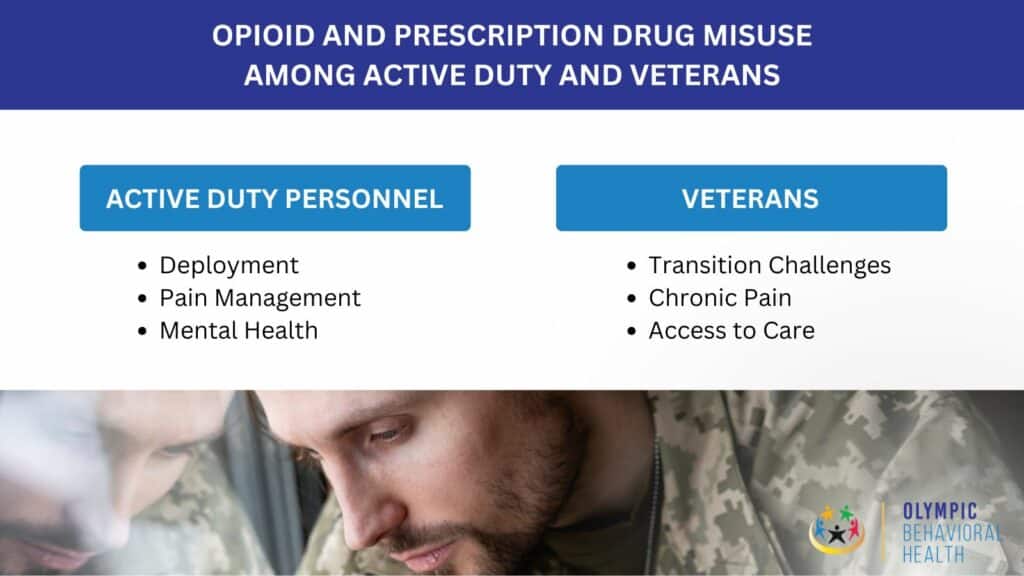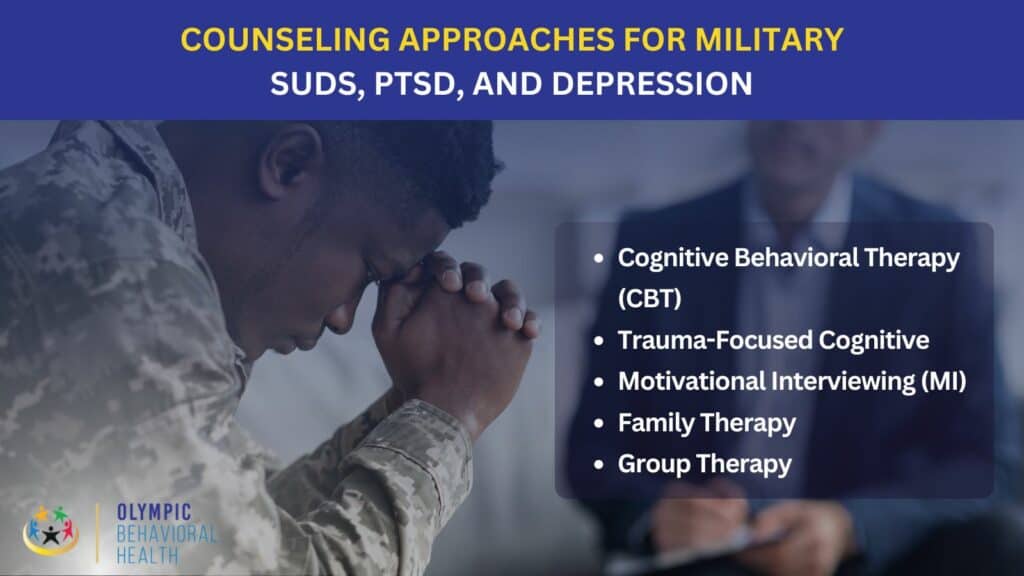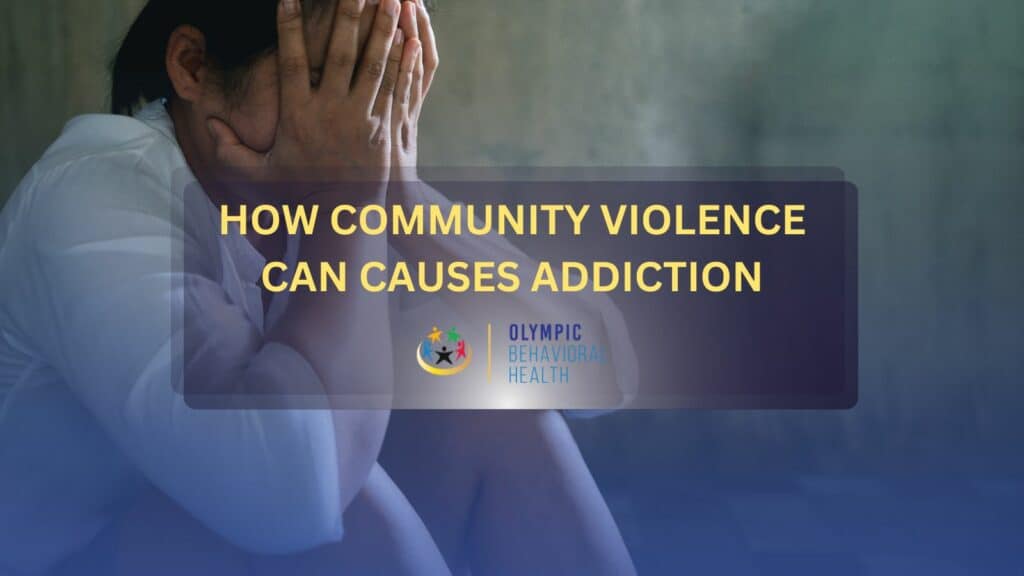While illicit drug use is a concern across society, the military presents a unique situation. The stresses of deployments, the strong camaraderie, and the ready availability of alcohol can all contribute to substance use issues. However, the military also has strict policies and random drug testing in place to deter drug use.
Military service members face a number of challenges that can increase their risk of substance use:
- Deployments: The stress and danger of deployments can lead to risky behaviors, including self-medication with drugs or alcohol.
- Military culture: The strong sense of community and shared experience in the military can make it difficult to seek help for substance use issues, as there may be a fear of being seen as weak.
- Access to alcohol: Alcohol is readily available on most military bases, and binge drinking is a significant problem.
According to the National Institute on Drug Abuse (NIDA), overall illicit drug use among active duty personnel is relatively low compared to the general population. Meadows, Sarah O., Charles C., et al in their 2015 survey in the Health Related Behaviors Survey: Substance Use Among U.S. Active-Duty Service Members shows that less than 1% of active service members have used illicit drugs in the past year. It’s important to not that only about 8.6% of all active members chose to participate in the survey.

Opioid and Prescription Drug Misuse among Active Duty and Veterans
Opioid and prescription drug misuse pose a significant threat to the well-being of both active duty military personnel and veterans. Understanding the risk factors and available resources is crucial in addressing this complex issue.
Active Duty Personnel
- Deployment: The stresses and potential for injury during deployments significantly increase the risk of prescription pain medication use. A study by Killeen, T. K., Weathers, R. W., & Goggans, S. in 2009 titled ‘Risk and protective factors for alcohol and illicit drug use among deploying soldiers. Drug and Alcohol Dependence’, shows a strong correlation between deployment and increased use of opioids.
- Pain Management: Military personnel are more likely to experience injuries that require pain management, leading to potential dependence on opioids a class of medications used to treat pain.
- Mental Health: Active duty personnel with mental health conditions, such as PTSD, are at a higher risk of misusing opioids and prescription drugs to self-medicate.
Veterans
- Transition Challenges: The transition from military service to civilian life can be difficult, leading some veterans to misuse prescription drugs to cope with stress, anxiety, or depression.
- Chronic Pain: Veterans are more likely than civilians to experience chronic pain due to injuries sustained during service, which can increase their reliance on pain medication.
- Access to Care: Veterans may face challenges accessing timely and effective mental health and addiction treatment services, hindering recovery efforts.
Opioid use among veterans is an important factor for addiction in the military. The Department of Veterans Affairs (VA) saw a troubling 60% increase in opioid prescriptions filled between 2002 and 2012 in a survey by the Veterans Health Administration in 2019 titled ‘Opioid prescribing in the VA.’ The same survey also showed opioid overdose deaths among veterans rose by a staggering 56% from 2010 to 2016, highlighting the severity of the issue.
The military and the VA are thus actively working to combat opioid and prescription drug misuse through various initiatives. Both the military and VA have implemented stricter guidelines and protocols to reduce the number of opioid prescriptions written.
Efforts are underway to expand access to mental health and addiction treatment services for active duty personnel and veterans. Educational programs are being implemented to raise awareness about the risks of opioid and prescription drug misuse among both active duty and veteran populations.
Alcohol Abuse and Addiction among Military Personnel
Alcohol abuse and addiction is a prevalent concern among military personnel, impacting both active duty service members and veterans. Studies reveal higher rates of binge drinking and alcohol use disorder (AUD) within the military compared to the civilian population.
The 2015 Department of Defense’s Health Related Behaviors Survey (HRBS) found that 30% of active-duty service members reported binge drinking (consuming a large number of drinks in a short period). This is higher than the 24.7% reported in the general adult population at that time.
Several factors contribute to this issue, as highlighted by a report from the report:
- Military-specific stressors: Combat deployments, permanent changes of station, and demanding training schedules expose service members to unique stressors that can heighten the risk of substance misuse compared to civilian life.
- Stress coping mechanisms: Research by the National Institute on Drug Abuse (NIDA) suggests that some service members may view alcohol as a way to manage stress or self-medicate for mental health challenges like PTSD and depression, potentially leading to dependence over time.
- Military culture: Drinking habits within a unit can influence individual behavior. A study published in the journal Military Medicine points out that heavy drinking might be normalized within certain social settings, making it harder to identify and address problematic alcohol use.
The U.S. military faces significant financial and operational burdens due to problematic alcohol use among service members. A 2009 study by Harwood et al. found that excessive alcohol consumption costs the military a staggering $1.12 billion annually.
Healthcare costs are also impacted, with research indicating an additional $425 million yearly expense associated with excessive drinking by military personnel.
Beyond the financial toll, alcohol abuse disrupts military readiness. Estimates suggest it leads to a loss of 320,000 work days per year, along with a concerning 34,400 arrests, with half involving driving under the influence (DUI).
Furthermore, this issue hinders deployment capabilities, with an estimated 10,400 active-duty personnel unable to deploy annually due to alcohol abuse. Additionally, excessive drinking contributes to the separation of roughly 2,200 service members from duty each year.
A report by the National Center for PTSD details some other consequences:
- Mental and physical health decline: Alcohol abuse can exacerbate mental health problems and contribute to various physical health issues like liver damage, heart disease, and even cancer.
- Increased accident and injury risk: Alcohol use can impair judgment and coordination, significantly increasing the risk of accidents and injuries.
- Relationship strain: Alcohol abuse can negatively impact relationships with family and friends.
- Suicide risk: Studies have shown a strong correlation between alcohol abuse and suicide risk.
Smoking, Vaping, and Nicotine Addiction: Prevalence in the Military
Smoking and, more recently, vaping have been concerns for military health for decades. While smoking rates have declined in recent years, they remain higher among service members than civilians. Vaping use also poses potential health risks, though the long-term effects are still being studied.
Smoking
According to the Centers for Disease Control and Prevention (CDC), in 2018, 18.4% of active-duty service members reported current cigarette smoking, compared to 14.0% of civilians. This means that smoking is still considerably more common among those serving in the military.
Factors Contributing to Smoking: There are several factors that may contribute to higher smoking rates among military personnel, including:
- Stress of military service
- Deployment
- Social factors and peer pressure
- Ease of access to tobacco products in some areas
Vaping
Data suggests vaping use may be lower in the military than among civilians. A 2020 study by the Department of Defense found that only 3% of military beneficiaries reported current vaping, compared to 8% of civilians.
While vaping may be less harmful than smoking cigarettes, the long-term health effects of vaping are still unknown. There is growing concern about the potential for lung injuries associated with vaping products, especially among young people.
Nicotine Addiction
Both smoking and vaping deliver nicotine, which is a highly addictive substance. Nicotine addiction can lead to dependence and withdrawal symptoms when someone tries to quit.
Efforts to Reduce Tobacco Use
The military has implemented a number of programs and policies to reduce tobacco use among service members, including:
- Smoking cessation programs
- Restrictions on tobacco sales on military bases
- Educational campaigns
Smoking remains a significant health concern for the military, despite declining rates. Vaping introduces new potential health risks, although use appears lower than among civilians. Nicotine addiction is a common thread between smoking and vaping, highlighting the importance of smoking cessation efforts.
Substance Use, Mental Health, and Military/Veteran Life
Military service and veterans face unique challenges that can increase their risk of substance use and mental health problems. Here’s a breakdown of the key points.
Substance Use
- Higher Rates: Compared to civilians, military personnel and veterans have higher rates of substance use disorders, particularly alcohol misuse. Teeters, J.B., Lancaster, C.L., et al in thier 2017 study ‘Substance use disorders in military veterans: prevalence and treatment challenges’ showed that. Studies suggest factors like combat stress, deployment, and difficulty adjusting to civilian life can contribute.
- Self-Medication: Some service members or veterans might misuse substances as a way to cope with mental health challenges like PTSD, anxiety, or depression.
- Consequences: Substance abuse can worsen mental health symptoms, lead to physical health problems, and negatively impact relationships, work performance, and overall well-being.
Mental Health
- PTSD and Substance Use Co-Occur: Post-traumatic stress disorder (PTSD) is a common mental health condition among veterans who have experienced trauma during service. People with PTSD are more likely to struggle with substance use disorders as well.
- Deployment Stress: Deployment and combat exposure can lead to a range of mental health challenges, including anxiety, depression, and traumatic brain injuries (TBI). These conditions can also increase the risk of substance use.
- Reintegration Challenges: Transitioning back to civilian life after military service can be difficult, and some veterans may struggle with feelings of isolation, unemployment, and a lack of purpose. These challenges can also contribute to mental health problems and substance abuse.

Counseling for Substance Use Disorders, PTSD, and Depression
Military personnel face unique challenges that can lead to substance use disorders (SUDs), PTSD, and depression. Fortunately, there are effective counseling options available to help them cope and heal. Here’s a breakdown of some counseling approaches that can be beneficial.
Types of Counseling
- Cognitive Behavioral Therapy (CBT): This evidence-based therapy is highly effective for treating a variety of mental health conditions, including PTSD and depression. CBT helps individuals identify negative thought patterns and develop coping mechanisms to manage difficult emotions and behaviors.
- Trauma-Focused Cognitive Behavioral Therapy (TF-CBT): This specialized form of CBT focuses on processing traumatic experiences associated with PTSD. It can help individuals develop coping skills to manage symptoms like flashbacks and nightmares.
- Motivational Interviewing (MI): MI is a collaborative counseling approach that helps individuals explore their ambivalence about change and build motivation to address substance use problems.
- Family Therapy: Substance use disorders, PTSD, and depression can impact the entire family. Family therapy can provide support and guidance for families coping with these challenges. It can help improve communication, problem-solving skills, and overall family functioning.
- Group Therapy: Connecting with others who share similar experiences can be a powerful source of support. Group therapy can provide a safe space for service members and veterans to share their struggles, learn coping mechanisms from each other, and feel less alone.
The Link Between Substance Use Disorders and Suicide in the Military
Substance use disorders (SUDs) and suicide are two critical issues affecting the military community. A disturbing yet well-established link exists between these challenges.
The Department of Veterans Affairs (VA) doesn’t provide a single statistic on the percentage of suicides involving SUDs among active-duty personnel. However, a 2020 VA report highlights that substance use disorders (particularly opioid use disorder) were associated with higher suicide rates than diagnoses like depression or PTSD. Additionally, The National Institute on Drug Abuse (NIDA) cites that substance use, particularly alcohol, was involved in about 30% of Army suicides and over 45% of attempted suicides since 2003.
Research paints a clear picture – individuals struggling with SUDs face a significantly higher risk of suicide compared to the general population. This increased risk can be attributed to several factors.
- Firstly, addiction is often accompanied by feelings of hopelessness, despair, and isolation, all of which are major risk factors for suicide.
- Secondly, substance use can cloud judgment and lead to impulsive behaviors, potentially resulting in self-harm.
The Underlying Factors
Several factors contribute to the strong link between SUDs and suicide in the military. One factor is self-medication. Some service members and veterans may turn to substances as a way to cope with mental health challenges like PTSD or depression. Unfortunately, this attempt at self-medication can backfire, further intensifying suicidal thoughts and feelings.
Military service itself can be a significant source of stress, and for some individuals, substance use becomes an unhealthy coping mechanism to manage that stress.
Additionally, stigma surrounding both mental health issues and substance use can be a significant barrier to seeking help. Individuals struggling with these challenges may feel isolated and ashamed, preventing them from accessing potentially life-saving support.
Addressing Homelessness among Veterans with Substance Use Disorders
Homelessness is a complex issue, and veterans with substance use disorders (SUDs) are a particularly vulnerable population. Here’s a breakdown of some key strategies to address this challenge.
Understanding the Link
- SUDs as a Contributing Factor: Research shows a strong correlation between SUDs and veteran homelessness. Substance use can strain relationships, lead to job loss, and ultimately contribute to housing instability.
- Self-Medication: Some veterans with mental health challenges like PTSD or depression might misuse substances as a way to cope. This can exacerbate mental health problems and further complicate efforts to secure stable housing.
Addressing the Root Causes
- Accessible and Effective SUD Treatment: Providing veterans with accessible and effective treatment programs for substance use disorders is crucial. These programs can equip veterans with the tools they need to manage their SUDs and rebuild their lives.
- Mental Health Support: Many veterans with SUDs also struggle with mental health conditions. Offering integrated treatment programs that address both SUDs and mental health can be highly beneficial.
Supportive Housing Options
- Housing First Model: This approach prioritizes getting veterans into stable housing quickly, without requiring sobriety as a precondition. Supportive services, like addiction treatment and mental health care, can then be provided while veterans are housed.
- Veteran-Specific Housing Programs: Developing and supporting housing programs specifically tailored to the needs of veterans can be highly effective. These programs can provide a safe and supportive environment where veterans can focus on recovery.
Additional Support Services
- Employment Assistance: Helping veterans secure meaningful employment can contribute to long-term housing stability. Job training programs and employment support services can be crucial resources.
- Social Services: Veterans experiencing homelessness may need help with basic necessities like food, clothing, and healthcare. Connecting them with social services can provide a vital safety net.
Collaboration and Community Involvement
- Government Agencies: Collaboration between the Department of Veterans Affairs (VA), Department of Housing and Urban Development (HUD), and other government agencies is essential for providing comprehensive support services.
- Community Organizations: Non-profit organizations and community-based programs play a vital role in supporting homeless veterans. Strengthening partnerships and collaboration can expand the reach and effectiveness of support services.
Addressing homelessness among veterans with SUDs requires a multifaceted approach. By focusing on evidence-based treatment, supportive housing options, and comprehensive social services, we can help veterans overcome these challenges and achieve lasting stability.
Treatment Options for Military Personnel
Military personnel experiencing substance use disorders (SUDs) have access to a range of effective treatment options. Here’s a breakdown of some key approaches.
Outpatient Treatment Programs
- Individual Therapy: This core treatment involves one-on-one sessions with a therapist. Therapists can employ various approaches, such as Cognitive Behavioral Therapy (CBT), to help individuals identify negative thought patterns and develop healthy coping mechanisms to manage cravings and triggers.
- Group Therapy: Connecting with others who share similar struggles can be a powerful source of support. Group therapy provides a safe space for service members to share their experiences, learn from each other, and feel less alone.
- Family Therapy: Substance use disorders can impact the entire family. Family therapy can provide support and guidance for families coping with addiction. It helps improve communication, problem-solving skills, and overall family functioning.
- Medication-Assisted Treatment (MAT): For certain SUDs, medication like methadone or buprenorphine can be a powerful tool for managing cravings and withdrawal symptoms. MAT, combined with therapy, is often considered a gold standard for treating opioid use disorder.
Inpatient Treatment Programs
- Residential Treatment: In some cases, more intensive treatment might be necessary. Residential treatment programs provide 24/7 care in a structured environment. These programs offer a safe space for individuals to focus solely on recovery, away from triggers and distractions.
- Partial Hospitalization Programs (PHP): PHPs offer intensive treatment during the day, while allowing individuals to return home in the evenings. This can be a good option for service members who need a higher level of care but still wish to maintain some connection to their families and daily routines.
Additional Considerations
- Military-Specific Treatment: The military offers treatment programs specifically tailored to the needs of service members. These programs address the unique challenges military personnel face, such as combat stress and deployment experiences.
- Accessibility and Confidentiality: Treatment options should be readily accessible and confidential to encourage service members to seek help without fear of stigma or repercussions on their careers.
- Co-Occurring Disorders: Many service members with SUDs also struggle with mental health conditions like PTSD or depression. Treatment programs that address both SUDs and mental health can be highly effective.
What other potential causes of addiction are there?
Beyond military-specific challenges, substance use disorders (SUDs) can arise from a complex mix of influences. Genetics play a part, with a family history of addiction increasing your risk. Brain chemistry also factors in, as some individuals have a reward system more prone to intense pleasure from substances, leading to problematic use.
Environmental factors like socioeconomic disadvantage can contribute. Poverty, unemployment, and lack of opportunities can make substances seem like an escape. Similarly, childhood trauma can disrupt brain development and heighten the risk of addiction as a coping mechanism. Social circles also influence your likelihood of developing an SUD. Peer pressure and easy access to substances can create a risky environment.
Mental health conditions like depression or PTSD can be intricately linked to SUDs. People might use substances to self-medicate difficult emotions or manage symptoms of these disorders. The earlier someone starts using substances, especially with a developing brain, the greater the risk of addiction. Remember, addiction is a complex disease, and understanding these various potential causes is crucial for creating effective prevention and treatment strategies.
Can Stressful Work Cause addiction?
Yes, stress from military service can contribute to addiction. The demanding and often traumatic nature of military work can lead to high stress levels, which can increase the risk for addiction. Additionally, the use of drugs and alcohol to cope with the stress and trauma of military service can further exacerbate the problem.
Can a lack of quality parenting cause addiction?
A lack of quality parenting can potentially contribute to the development of addiction. Military service can expose individuals to a range of trauma and stressors that can lead to substance abuse and addiction. Furthermore, a lack of nurturing and supportive parenting may leave individuals vulnerable to turning to drugs or alcohol as a coping mechanism.

Share This Post



